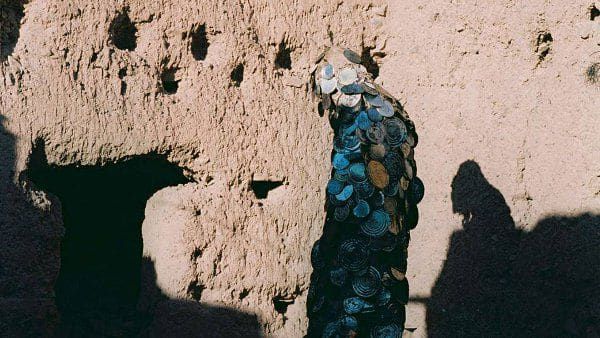Eye For Film >> Movies >> The Sky Trembles And The Earth Is Afraid And The Two Eyes Are Not Brothers (2015) Film Review
The Sky Trembles And The Earth Is Afraid And The Two Eyes Are Not Brothers
Reviewed by: Jennie Kermode

In commencing an analysis of this film, it's worth noting that the vast majority of cinemagoers won't go anywhere near it because of its title. This is a good thing - if they feel that way, it's highly unlikely that they would find it in the least bit pleasing. Let us focus, then, on those people who do make it that far, suitably forewarned. Will they consider it worth their while? On balance, the answer is yes. Some just won't manage to connect but others will relish its intelligence and find it deeply moving. To risk this degree of pretension, one has to have some strong ideas, and Ben Rivers really does.
The title is a line from author and composer Paul Bowles' 1947 short story A Distant Episode, upon which much of the plot is based. It's recited early in the film on the set of another (real) film, Oliver Laxe's Mimosas (itself a mixture of documentary and fiction). Rivers is always an interesting observer of reality and here he creates a portrait of Laxe's work that's poetic and full of odd juxtapositions. Laxe is following a group of nomads as they travel through mountain country. At one point we watch a stunt being performed. A man falls from a ledge to land safely on a big pile of cardboard boxes hidden below. Like all real stunt work, it's unnerving to watch - just a slight error could see the man slam into the rock face or tumble down at one side of his pre-arranged landing place. This is emphasised with a comment about his marks. How easily disaster could occur if this were reality, if the film team weren't there!

Perhaps haunted by a desire to test the real, Laxe wanders from the set and (we are assured) into fiction. Set upon by strangers, he is swaddled in cloth and sent floating down the river. When he arrives at a village he is stripped (of his own clothes too) and forced to put on a suit covered with tin can lids, bright shining discs that reflect the harsh light of the Moroccan sun. We cannot see his face and from this point onward he is increasingly depersonalised. The processes are undertaken so immediately and completed with such efficiency that they would seem to be familiar to the Reguibat nomads practicing them. Laxe has come to them as a fool, as a man who would be king for a day, and seems to be being prepared for sacrifice. But fate has something stranger in store.
A rambling odyssey reminiscent of the work of Alejandro Jodorowsky, The Sky Trembles And The Earth Is Afraid And The Two Eyes Are Not Brothers has a lot going on beneath the surface. It may be a film of few words (beyond the title) but it speaks through music, with some of the tribal songs to which the King of the Tin Cans is forced to dance - and, indeed, the jingling of those cans themselves - resembling Bowles' concertos. The film is, of course, alert to the legacy of colonialism, and so it seems fitting that Laxe should have become a musical instrument, given the fondness colonists have always had for appropriating and belittling the music of the conquered. There's also a parallel drawn between music and film - Laxe, after all, was arguably exploiting local people for entertainment. so it would seem reasonable that the same has happened to him. This is a literally embodied revenge. Nevertheless, we stay with Laxe, and Rivers demonstrates a curious ability to make us feel for him more strongly as he becomes less human, so that we continue to hope for his redemption.
Some people will doubtless find the film too slow, but it has a dreamlike rhythm and a mythic character that depends on a degree of repetition. If you can find the rhythm of it, it's easy to get caught up in the dance.
Reviewed on: 14 Feb 2016
















